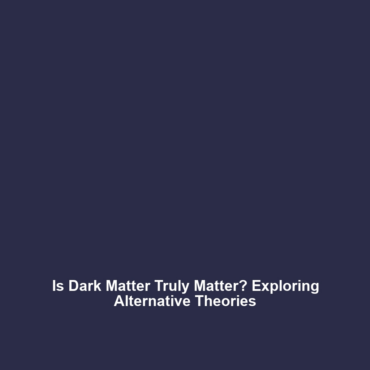Is Dark Matter Really Matter? Alternative Theories
Introduction
Dark matter presents one of the most profound mysteries in astrophysics, influencing galaxy formation and cosmic structure. The question, Is dark matter really matter?, is pivotal to understanding not only dark matter itself but also dark energy. This inquiry opens the door to alternative theories that challenge traditional views of cosmic composition. As scientists strive to unlock the secrets of the universe, exploring alternative theories surrounding dark matter is essential for a comprehensive grasp of dark matter and dark energy.
Key Concepts
What is Dark Matter?
Dark matter is a hypothetical form of matter that does not emit, absorb, or reflect any electromagnetic radiation, making it invisible and detectable only through its gravitational effects. It is believed to constitute about 27% of the universe’s total mass and energy content.
Alternative Theories
Several alternative theories exist that question the conventional understanding of dark matter:
- Modified Newtonian Dynamics (MOND): Suggests modifications to Newton’s laws to explain galaxy rotation without invoking dark matter.
- Emergent Gravity: Poses that gravity is an emergent phenomenon rather than a fundamental force, potentially eliminating the need for dark matter.
- Fluid Dark Matter Models: Proposes that dark matter behaves like a fluid rather than individual particles.
Applications and Real-World Uses
Understanding whether dark matter is truly matter has significant implications:
- Astrophysics Research: Advancements in dark matter theories guide observational strategies and the design of telescopes.
- Cosmological Simulations: Improved models of galaxy formation can lead to more accurate predictions of cosmic evolution.
- Particle Physics Experiments: Technologies developed to detect dark matter can also enhance other areas of particle physics.
Current Challenges
There are numerous challenges faced in studying the question of whether dark matter is really matter:
- Insufficient empirical evidence for dark matter particles.
- The complexity of galactic dynamics and the impact of baryonic matter.
- Challenges in reconciling alternative theories with observational data.
Future Research and Innovations
Future research in the realm of dark matter could yield innovative insights:
- Next-generation telescopes like the James Webb Space Telescope may uncover new data illuminating dark matter’s role.
- Advancements in particle accelerators, such as CERN, potentially leading to evidence supporting or refuting dark matter theories.
- Development of sophisticated simulations to model dark matter interactions more accurately.
Conclusion
The exploration of whether dark matter is truly matter is a critical undertaking in modern astrophysics, encapsulating alternative theories that may redefine our understanding of the universe. As research progresses, these inquiries not only deepen our knowledge of dark matter and dark energy but also inspire technological innovations. For more insights into dark matter and related cosmic phenomena, explore our related articles as we continue to investigate these mysteries of the cosmos.
